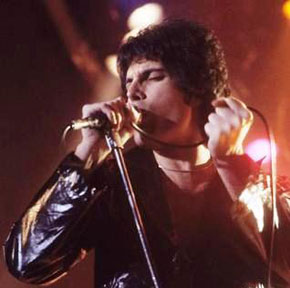A voice like no other
 On Freddie Mercury's 70th birth anniversary, Reji Varghese pays
tribute to one of the greatest voices in rock On Freddie Mercury's 70th birth anniversary, Reji Varghese pays
tribute to one of the greatest voices in rock
For a man who's been dead for 25 years, its odd how Freddie Mercury's
name keeps popping up in the news.
A few weeks back it was Donald Trumps grand entrance at the
Republican National Convention, to Freddie Mercury's , "We Are The
Champions". The unauthorized use of that song and Queen's statement
disassociating the band with Trump's "unsavoury campaign" became news,
over the next couple of days.
A month before that, it was a notebook that Freddie Mercury had used
to pen lyrics for the songs he wrote, that went up for auction, that
made headlines across the world.
But, to me the news item that would explain why Freddie Mercury has
still not faded from public memory 25 years after his death was a
research paper published by a group of Austrian, Czech, and Swedish
researchers in April titled 'Freddie Mercury - Accoustic Analysis of
Speaking, Fundamental Frequency, Vibrato and Subharmonics.'
Science stories don't make international headlines unless it's
something very significant like the discovery of a new sub-atomic
particle or a star, or the Nobel prize being announced. So it was very
odd indeed that a research paper on a rock star's vocal chords would
make international news - from CNN to Fox News to Time Magazine, and
many other publications worldwide.
The study found that the Mercury created those stunning vibratos by
using subharmonics, a singing style where the ventricular folds vibrate
along with the vocal folds. This is a technique used by Mongolian throat
singers and most human beings never speak or sing with their ventricular
folds.
Perhaps, this explains why Freddie Mercury's voice was like no other.
He could be low and throaty, fragile and tender, and reach a pristine,
high, operatic coloratura - all in the same song. But Freddie was not
only a great singer, he was also a brilliant songwriter and an
accomplished piano player.
In an interview to the BBC, Spanish Opera soprano Montserrat Caballé
says - "People think of Freddie only as a rock singer, but he was a
great musician. At his home, one night, I told him I loved Chopin's
'Impromptu'. He just sat at the piano and played it to me. We were there
until 6 o'clock in the morning."
Freddie's first formal piano lessons were not in glitzy London but in
St. Peter's boarding school in sleepy Panchgani, a hill station close to
Pune. At the time there was no Freddie Mercury either - he was known as
Farrokh Bulsara, the name given to him by his Parsi parents. While at
school, he got his first taste of Rock n Roll playing piano in the
school band at the age of 12.
Mercury's love of western classical made Queen's music a bit
different from the regular rock music of the time. One of my favorite
Queen songs, "The Show Must Go On", is about Mercury continuing to
perform despite being terminally ill. When the song was being recorded
the other band members were concerned whether Mercury would be
physically capable of singing the song as he could hardly walk. As Brian
May recalls, "I said, 'Fred, I don't know if this is going to be
possible to sing.' And he went, 'I'll f---ing do it, darling' - vodka
down - and went in and killed it, completely lacerated that vocal." |

